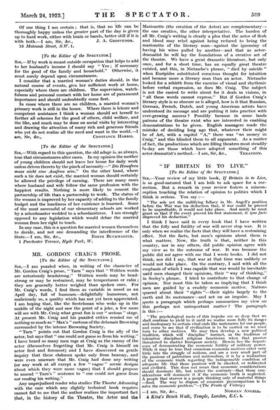MR. GORDON CRAIG'S PROSE. [To the Editor of the SPECTATOR.]
SIR,—I am puzzled when, in writing of the character of Mr. Gordon Craig's prose, " Tam " says that " Written words are notoriously headstrong." Written words may be head- strong or may be restrained, may be tempestuous or calm ; they are generally better weighed than spoken ones. For Mr. Craig's words, I find them as variable in mood as an April day, full of humours—delightfully humorous, not maliciously so, a quality which has not yet been appreciated.
I am hoping that, like the Scotchman who woke up in the middle of the night and saw the point of a joke, a few more will see with Mr. Craig what great fun is our " serious " stage. At present Mr. Craig and his puzzled critics remind me of nothing so much as " Max's " cartoon of the debonair Browning surrounded by the intense Browning Society.
" Tarn " points out. that Gordon Craig is the ally of the actor, but says that " one could not guess so from his writing." I have heard so many men rage at Craig as the enemy of the actor (themselves forgetting that Mr. Craig is himself an actor first and foremost) and I have discovered on gentle inquiry that these clubmen spoke only from hearsay, and were even unaware that Mr. Craig had done any writing (or any work at all except a few " vague " scenic designs about which they were more vague) that I should propose to amend " Tam's " sentence to " one could not guess from not reading his writing."
Any unprejudiced reader who studies The Theatre Advancing with the care which any slightly technical book requires cannot fail to see that the author realizes the important fact that, in the history of the Theatre, the Actor and the
Marionette (the creation of the Actor) are complementary— the one creative, the other interpretative. The burden of all Mr. Craig's writing is clearly a plea that the actor of flesh and blood may rebel against being reduced to being the marionette of the literary man—against the ignominy of having his wires pulled by another—and that as actor- dramatist he will lay the foundations of a creative art of the theatre. We have a great dramatic literature, but only once, and for a short time, has an equally great theatre existed, and this, in Nietzsche's phrase, " died by suicide " when Euripides substituted conscious thought for intuition and became more a literary man than an actor. Nietzsche looked for a rebirth from the exercise of visual and rhythmic before verbal expression, as does Mr. Craig. The subject is not the easiest to write about for it deals in visions, in " all these words cannot express." But if Gordon Craig's literary style is so obscure as is alleged, how is it that Russian, German, French, Dutch, and young American artists have understood its message and are putting it into practice with ever-growing success ? Possibly because in some lands patrons of the theatre exist who are interested in enabling demonstrations to be given. English managers made the mistake of deciding long ago that, whatever their might be of Art, with a capital "A," there was "no money in Craig," and this blinded them to all argument.. As a matter
of fact, the productions which are filling theatres most steadily to-day are those which have adopted something of this
actor-dramatist's method.—I am, Sir, &c., THEATRON.


































































 Previous page
Previous page